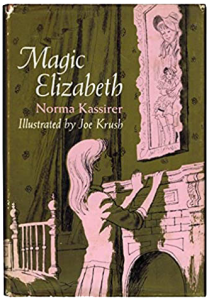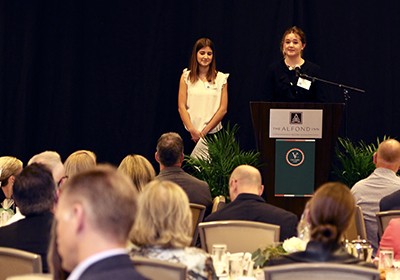Magic in Our Hands
By Christina Walker, Advancement Office

Do you ever think back on your favorite book from your childhood (or books … it may be impossible to narrow it down to just one)? Magic Elizabeth by Norma Kassirer took me into another world from the first words on the first page, a magical, mysterious journey that I remember to this day. For many years, my book was lost: it had disappeared at my parents’ house sometime between when I was a young girl and when I got married and moved out. I tried finding it online and discovered much to my dismay that I could get a copy for $200 or $500 (depending on if I wanted hardback or paperback)! One day, over a decade later during one of my visits back home, my mom brought down a box she had uncovered in their attic for me to look through. As I sorted through the contents, laughing hysterically at some of the papers and notebooks that had transformed this old cardboard box into a treasure chest, I came upon a book. I screamed with joy and amazement and tears sprang to my eyes as I realized that my Magic Elizabeth was not gone forever after all!
Even though pages turn yellow and covers fall to pieces, the power of good stories does not fade with time.
I was able to share this magical story with my youngest daughter, along with many other books that I had loved as a child or that I had discovered as a parent who read to my children. Reading with Michaela (‘19), Christian (‘21), and Eliana (‘26) is now one of my treasured memories (every now and then, Eliana and I will read something together still). The time spent opening up our imaginations and making our way into and through someone else’s world was (and still is) a multifaceted gift.
My oldest, Michaela, wrote her senior thesis for Geneva about the importance of reading for Christians. The title of her paper, “Make America Read Again: The Christian Need for Literature in a Consumer Society,” reflects her astute observation (and honest self-reflection) about the world we live in, especially as Americans. She notes that reading well helps us “combat this society’s cultural attacks on our ability to know and glorify God.” From shaping minds to developing thought processes, from recognizing the ways that human beings reflect the image of God to becoming more virtuous, reading—and especially reading well—helps us to know ourselves and our Creator better and to bring glory to him as we learn from and embody virtues we encounter in the stories we read.
Remember those magical moments, exciting journeys, painful circumstances, and winding roads found within the pages you have turned. Sit with your little ones, and sit with your older children too! Enter into a wardrobe that leads to “the middle of a wood at night-time with … snowflakes falling through the air,” or warily welcome Mrs. Whatsit into your kitchen in the middle of the night during a hurricane. Watch happily from a log as “seven Trumpeters all in a line, five of them just out of the egg,” glide toward you and then “Beep” joyfully for you, except for a quiet one who does something no one would expect a baby swan to do. Or watch your mama, a teacher in your school—”one of the largest black schools in the county”—as she deliberately trims paper in order to cover the chart inside of the school book you are going to receive, “somebody’s old throwaways,” … knowing “She understood.”
Read to understand. Read to grow. And read because there are, as Michaela reminds us in her thesis, “books out there that you will enjoy.”
Books referenced or quoted:
Magic Elizabeth by Norma Kassirer
The Lion, the Witch and the Wardrobe by C. S. Lewis
A Wrinkle in Time by Madeleine L’Engle
The Trumpet of the Swan by E. B. White
Roll of Thunder, Hear My Cry by Mildred D. Taylor



